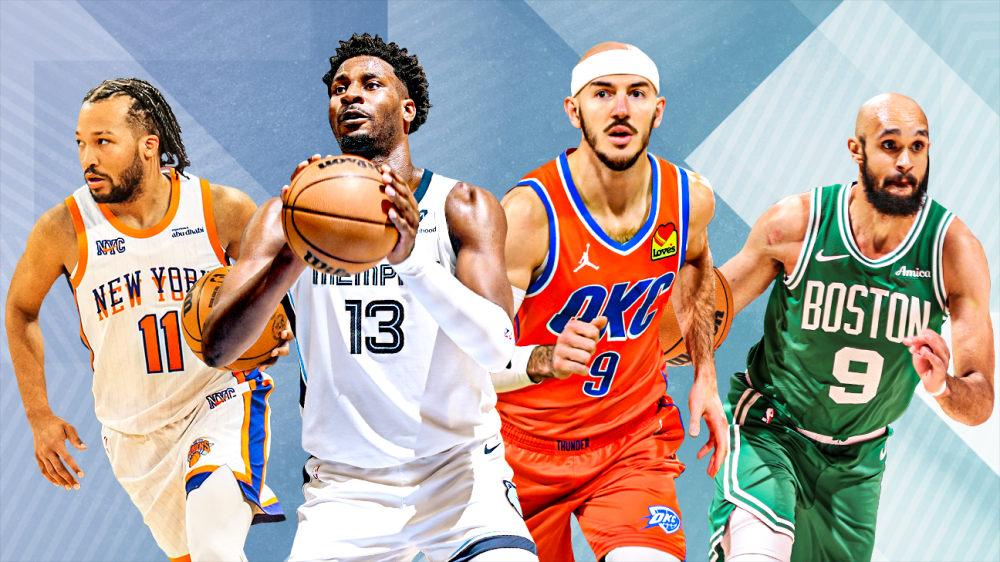NBA All-Contract Team: Knicks’ Brunson leads our 15-man roster

When constructing championship-level teams in the NBA, the single most important component is having a true franchise player. But to take advantage of that kind of transformative talent and lift the Larry O’Brien Trophy, such teams also need to find ways to complement that superstar.
The league has seen how impactful those final players can be. In 2023, the Denver Nuggets won the title, in part, by landing Bruce Brown on a bargain deal as a free agent. Last season, the Boston Celtics constructed a roster featuring several long-term value contracts for key players such as Derrick White, Payton Pritchard and Sam Hauser.
In 2021, a major factor in the Milwaukee Bucks’ championship team was the addition of Brook Lopez three years prior on a deal just over the minimum. And of course, the dynastic run of the Golden State Warriors — up to and including signing Kevin Durant — was possible because two-time MVP Stephen Curry was signed to one of the best value contracts in league history.
With today’s harsh financial restrictions set forth by the new collective bargaining agreement, signing players to smart contracts is more important than ever, as several contenders have struggled with adding depth.
But what would a team of nothing but smart contracts look like? How many wins could it get if it was dropped into the league this season? We’re assembling a full, 15-man roster made up of the very best deals in the league (from a team-building perspective) and putting it to the test.
Let’s get to the roster, which features four defending champions and a big man on this season’s best team and is quarterbacked by a guard who finished in the top five in last season’s MVP voting.
Point guards
![NBA All-Contract Team: Knicks' Brunson leads our 15-man roster NBA All-Contract Team: Knicks' Brunson leads our 15-man roster 2 | ASL]() Jalen Brunson, New York Knicks
Jalen Brunson, New York Knicks
Contract: $24.9 million
One of the bigger fork-in-the-road moments of the past few offseasons was Brunson leaving the Dallas Mavericks and signing a four-year, $100 million contract as a free agent with the Knicks. That the deal came a generation after Steve Nash left Dallas to sign a free agent contract with Phoenix, where he blossomed into a Hall of Fame point guard, is an irony that surely isn’t enjoyed by Mavericks fans.
Brunson has turned himself into a 25-point-per-game scorer and a 40% 3-point shooter (with volume) while also solidifying his already sterling reputation as one of the best leaders and locker room presences in the league. He has been the central figure in New York’s rise to potential championship contention, in no small part due to the $113 million less he took on his latest extension, allowing New York to further build out its roster.
 Payton Pritchard, Boston Celtics
Payton Pritchard, Boston Celtics
Contract: $6.7 million
Pritchard, a leading Sixth Man of the Year contender who is averaging 14.6 points and shooting 41.3% from 3-point range on 8.3 attempts per game, will be a mainstay on this list. Pritchard is in the first year of a four-year, $30 million rookie extension that won’t ever touch 5% of the total salary cap. Pritchard has been a key reserve in what the Celtics hope will be their own dynastic run.
And team-friendly deals such as Pritchard’s are why the Celtics can start five players making a total of $163.3 million; that’s almost as much as our team’s 15-man roster.

Scotty Pippen Jr., Memphis Grizzlies
Contract: $2.1 million
Pippen is one of several success stories on Memphis’ roster, where he is in the first year of a four-year deal that will pay him less than $10 million total. He has more than capably filled in as the starting point guard for the Grizzlies whenever Ja Morant has been sidelined with injuries this season, averaging 13.9 points, 4.1 rebounds and 5.4 assists in 16 games as a starter in place of Morant. Pippen has shot 51.9% from the floor and 42.9% from 3-point range in those games.
He should be Morant’s understudy in Memphis for the foreseeable future on his current deal — and could repeatedly wind up on this team going forward as a result.
Shooting guards
 Derrick White, Boston Celtics
Derrick White, Boston Celtics
Contract: $20.1 million
Before arriving in Boston, White had been a sub-35% 3-point shooter in San Antonio, and the general belief around the league was that he was more of a third guard than a consistent starter. But now that he is not only shooting in the high 30s from 3 but on massive volume (38.5% on more than nine attempts per game this season), White has fully emerged into an All-Star-caliber guard.
At 6-foot-5 with his playmaking skills, defensive chops (he’s averaging at least a block per game for a second straight campaign) and that shooting component, he’s a value on this contract before his extension kicks in next season and also a perfect complementary player next to Brunson in our starting backcourt.
![NBA All-Contract Team: Knicks' Brunson leads our 15-man roster NBA All-Contract Team: Knicks' Brunson leads our 15-man roster 6 | ASL]() Deuce McBride, New York Knicks
Deuce McBride, New York Knicks
Contract: $4.7 million
When New York sent Immanuel Quickley to the Toronto Raptors as part of the OG Anunoby trade in the middle of last season, the Knicks immediately signed McBride — a former second-round pick who had, to that point, played sparingly across his first 2½ seasons in the league — to a three-year, $13 million deal and instantly installed him as Quickley’s replacement as New York’s first guard off the bench.
It was a smart piece of business, as McBride stepped into the rotation and showed he could play right away, shooting over 40% from 3 each of the past two seasons while also being a pest defensively. He easily could be slotted in as a point guard too, as he — like Pritchard — can play on or off the ball, and McBride also gives us a lot of flexibility in playing any of these guards in combination.
 Nickeil Alexander-Walker, Minnesota Timberwolves
Nickeil Alexander-Walker, Minnesota Timberwolves
Contract: $4.3 million
While his cousin in Oklahoma City (Shai Gilgeous-Alexander) gets far more attention, Nickeil Alexander-Walker has turned himself into a rotational NBA player over the past couple of seasons in Minnesota, carving out a spot as a true 3-and-D wing player.
His free agency this summer will be interesting to watch, as he will be an unrestricted free agent and Minnesota already has an extremely expensive team. With how he’s played the past couple of years, Alexander-Walker seems very likely to get a sizable raise this coming offseason — and with it, a likely change in scenery.
Small forwards
![NBA All-Contract Team: Knicks' Brunson leads our 15-man roster NBA All-Contract Team: Knicks' Brunson leads our 15-man roster 8 | ASL]() Josh Hart, New York Knicks
Josh Hart, New York Knicks
Contract: $18.1 million
To take you behind the curtain a bit here, this spot was originally filled by New Orleans Pelicans forward Herb Jones and his $12.9 million contract. But with Jones now out indefinitely — and given where the Pelicans are in the standings, likely for the season with a torn rotator cuff — we shifted the roster around to accommodate Hart, who is in the first year of a four-year extension.
As a rugged, do-it-all forward shooting well north of 50% from the field while also being able to push the pace and handle the ball, he’s a great option to be our starting small forward, and he does all of the things that make him such an essential part of Tom Thibodeau’s Knicks teams over the past couple of seasons. Plus, our team chemistry will be through the roof having him and podcast partner Brunson in the starting five.

Dean Wade, Cleveland Cavaliers
Contract: $6.1 million
The only question about Wade over the past couple of years has been his availability, as he has dealt with a handful of nagging injuries. But when he is on the court, he has become a key cog for Cleveland on the wing as a solid 3-and-D option at 6-foot-9 who can hold up at either forward spot.
He’s slotted in perfectly alongside the Cavaliers’ four potential All-Stars currently, with that group going 17-2 in the games it has played together this season. For our team, though, he’ll slot in as the backup small forward, helping to limit his minutes and also provide another bigger option on the wing behind Hart.
![NBA All-Contract Team: Knicks' Brunson leads our 15-man roster NBA All-Contract Team: Knicks' Brunson leads our 15-man roster 10 | ASL]() Sam Hauser, Boston Celtics
Sam Hauser, Boston Celtics
Contract: $2.1 million
Hauser’s rapid development from a two-way player to a core rotation player for an NBA champion last season is a model for how teams should utilize the back half of their rosters and proof that they can develop players while being in championship contention, as Boston has been for the better part of a decade.
Back issues this season have contributed to Hauser’s dip in shooting (36% after going above 40% in each of his first three seasons). That kind of shooting is simply too good to pass up with that contract.
Power forwards
 Jaren Jackson Jr., Memphis Grizzlies
Jaren Jackson Jr., Memphis Grizzlies
Contract: $25.2 million
The 2023 Defensive Player of the Year has been the most prominent example of a stretch power forward who can also provide elite defense and rim protection. And while he has never returned to the halcyon days of his second year in the league, when he shot 39% from 3 on more than six attempts per game, Jackson has settled in as a 34.5% shooter whom teams will at least respect from behind the arc.
On our team, he also would be playing next to a pair of centers who will mitigate his rebounding issues, making him a snug fit in the starting lineup of this group as its power forward. And his contract descends for yet another season before he becomes an unrestricted free agent in 2026.
![NBA All-Contract Team: Knicks' Brunson leads our 15-man roster NBA All-Contract Team: Knicks' Brunson leads our 15-man roster 12 | ASL]() Derrick Jones Jr., LA Clippers
Derrick Jones Jr., LA Clippers
Contract: $9.5 million
At 6-foot-6 and 210 pounds, Jones is a little small for a power forward. But between his 7-foot wingspan and high-flying athleticism, he has always played bigger than his frame and could slot in against backup units just fine at the 4.
More importantly, Jones has followed up last season’s strong showing in Dallas with a career-best 34.5% mark from 3-point range (albeit on fewer than three attempts per game), and as he showed in the playoffs, he’s capable of effectively guarding some of the league’s elite perimeter players. Couple that with a contract that will be under 7% of the salary cap for the next three seasons, and he’s a great fit as a depth forward on this squad.
 Al Horford, Boston Celtics
Al Horford, Boston Celtics
Contract: $9.5 million
It’s a true testament to Horford’s incredible longevity that the 38-year-old could be an option for this list. But he remains an excellent 3-point shooter (37% on 5.3 attempts per game) and has shown over the past few years in Boston that he’s quite capable of playing either as a lone center on the court or alongside Kristaps Porzingis in different matchups.
On a balanced roster with this kind of depth, Horford could easily plug into the rotation when needed, and be given time off when he needs a break, keeping him fresh for a potential deep postseason run. And in a league where versatile size is more valuable than ever before, finding a big who provides that for under $10 million is a great bargain.
Centers
![NBA All-Contract Team: Knicks' Brunson leads our 15-man roster NBA All-Contract Team: Knicks' Brunson leads our 15-man roster 14 | ASL]() Jarrett Allen, Cleveland Cavaliers
Jarrett Allen, Cleveland Cavaliers
Contract: $20 million
Allen has been metronomically consistent for the past several years, first in Brooklyn and now in Cleveland, operating as an efficient double-double machine. He and Minnesota Timberwolves center Rudy Gobert are the only players since 2019-20 to average at least 14 points and 10 rebounds per game while shooting over 60% from the field.
Allen will be a tremendous pick-and-roll partner for Brunson and will remain on a bargain contract until his max extension kicks in next season.

Ivica Zubac, LA Clippers
Contract: $11.7 million
In his ninth year, Zubac is having a career season for the Clippers, averaging 14.9 points and 12.5 rebounds while shooting 61.4% from the floor. A 7-footer who is a tremendous rebounder and has good hands, Zubac has proved to be a great fit catching feeds from James Harden, and he would be able to do the same with Brunson. He also has the size to handle any of the bigger centers that Allen is unable to, making them a souped-up version of the two-big combo that the Dallas Mavericks currently have in Dereck Lively II and Daniel Gafford, and the one the Knicks had last season with Mitchell Robinson and Isaiah Hartenstein.
Zubac could still be a good fit for this team when his extension kicks in next season, but he’s an obvious choice on his current deal.
![NBA All-Contract Team: Knicks' Brunson leads our 15-man roster NBA All-Contract Team: Knicks' Brunson leads our 15-man roster 16 | ASL]() Jay Huff, Memphis Grizzlies
Jay Huff, Memphis Grizzlies
Contract: $2.1 million
The irony of both Huff and Pippen being on this list as developmental success stories for the Grizzlies this season is that both of them were once part of the Lakers’ system. Each would fill roles the team is currently looking for. Instead, they’re both doing it for the Grizzlies on deals that run for the next three-plus seasons at a combined total under $10 million. Huff is hitting 41.5% of his triples on 3.9 attempts per game and also has registered 1.1 blocks per game in 15 minutes a night.
How would the All-Contract Team do in 2024-25?
Now that we know the 15 players who would make up this All-Contract Team, it raises an obvious question: How would that team fare if it were dropped into the current league?
As it turns out: quite well. That is, at least when measured using ESPN NBA Insider Kevin Pelton’s wins above replacement player metric. (Team success was determined through a combination of minutes played and a percentage of games played this season, which was then combined with their WARP.)
The numbers indicate this team would have a net rating of plus-11.8 points per 100 possessions — giving it an expected win percentage of .809, which is a 66-win pace. The only team in the NBA with a better net rating as of Monday is Oklahoma City, and the only teams on pace to win more games this season are the Thunder and the league-leading Cavaliers.
Why is this group projected to have that kind of success? Its depth, overall and in its starting lineup. Thirteen players (more than that of any other team) have at least 1.0 WARP this season. The Grizzlies lead the league with 11 players, while the Thunder have 10 and the Cavaliers have nine.
Meanwhile, our team includes seven players — starters Brunson, White, Hart, Jackson and Allen and reserves Pritchard and Zubac — who are over 2.0 WARP for the season. That ties the Cavaliers, who have the most of any NBA team. Boston and Oklahoma City are tied for second with five each.
While this team rates very strongly, there are some question marks around how it would fare in a deep playoff run. Historically, teams built around a small guard like Brunson have struggled to make it all the way to a title. Overall, this team is a little light on size at both guard and small forward (though Hart plays bigger than his 6-foot-4 height thanks to his elite rebounding), which could make defending in the playoffs a challenge.
But choices have to be made to build a team on a budget. And in today’s NBA, the top five teams by record — Cleveland, Oklahoma City, Boston, Memphis and the Houston Rockets — are built on depth. This group is built in a similar way and should withstand the rigors of an 82-game season.
Source: espn.com

 Jalen Brunson, New York Knicks
Jalen Brunson, New York Knicks Deuce McBride, New York Knicks
Deuce McBride, New York Knicks Josh Hart, New York Knicks
Josh Hart, New York Knicks Sam Hauser, Boston Celtics
Sam Hauser, Boston Celtics Derrick Jones Jr., LA Clippers
Derrick Jones Jr., LA Clippers Jarrett Allen, Cleveland Cavaliers
Jarrett Allen, Cleveland Cavaliers Jay Huff, Memphis Grizzlies
Jay Huff, Memphis Grizzlies